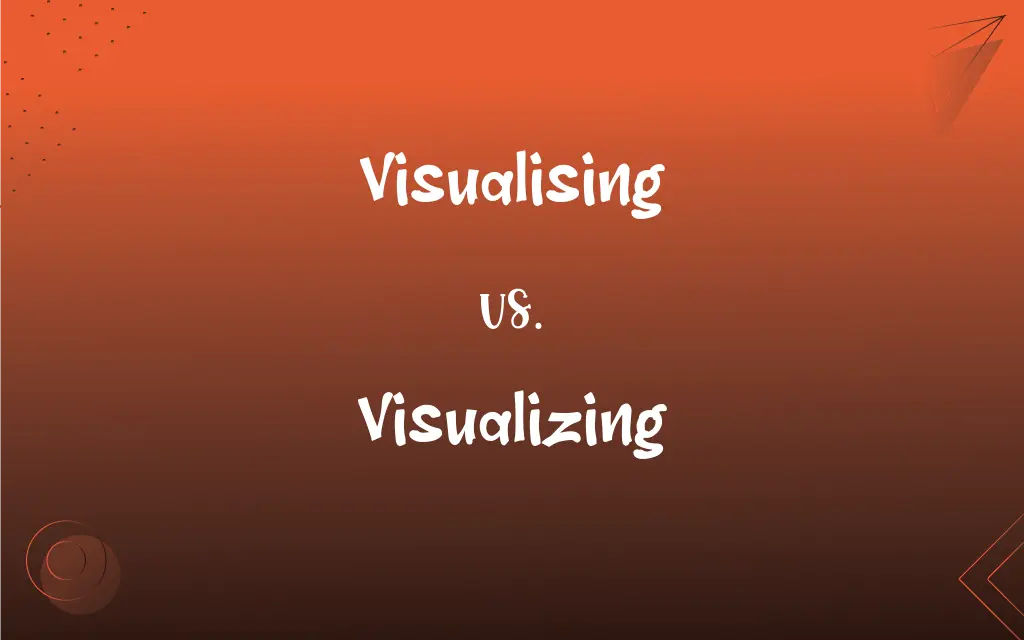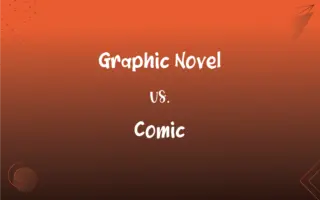Visualising vs. Visualizing: What's the Difference?
Edited by Harlon Moss || By Janet White || Published on December 15, 2023
"Visualising" and "visualizing" are the same in meaning, forming mental images, but differ in spelling; "visualising" is British English, "visualizing" is American English.

Key Differences
"Visualising" is the British English spelling, while "visualizing" is the American English variant. This difference reflects the general trend of spelling variations between these English dialects.
Both "visualising" and "visualizing" mean to form mental images or envision something. This process involves using the imagination to create a picture in the mind.
In literature, "visualising" is commonly used in British publications, whereas "visualizing" is preferred in American texts. The choice of spelling can indicate the intended audience or origin of the work.
The evolution of English has led to these spelling differences. While American English often simplifies spellings (like dropping the 's' for a 'z'), British English retains more traditional forms.
Regardless of the spelling, "visualising" and "visualizing" are understood globally in English-speaking contexts. The context, rather than the spelling, usually guides the interpretation.
ADVERTISEMENT
Comparison Chart
Spelling Tradition
British English
American English
Letter Usage
's' used
'z' used
Linguistic Origin
Reflects traditional English spelling
Reflects American English spelling simplifications
Common Usage
Predominantly in the UK and Commonwealth countries
Predominantly in the USA
Global Recognition
Recognized worldwide, but less common in the US
Recognized worldwide, but less common in the UK
ADVERTISEMENT
Visualising and Visualizing Definitions
Visualising
Mentally simulating a process or event.
The athlete kept visualising the race to improve performance.
Visualizing
Forming a mental picture.
She was visualizing the layout of her new apartment.
Visualising
Creating a mental image.
He was visualising his dream home in vivid detail.
Visualizing
Conceiving an idea or plan in the mind.
Visualizing the project's steps helped him organize his thoughts.
Visualising
Picturing a future event.
Visualising success can be a powerful motivational tool.
Visualizing
Envisioning a desired future.
Athletes often practice visualizing their victory before a competition.
Visualising
Forming an image of something not present.
He was visualising the ancient city as it might have looked.
Visualizing
Imagining a possible scenario.
He spent hours visualizing different outcomes of the meeting.
Visualising
Imagining a concept or idea.
She spent the evening visualising the steps of her dance routine.
Visualizing
Mentally representing an abstract concept.
Visualizing peace can be a form of meditation.
Visualising
Present participle of visualise
Visualizing
To form a mental image of; envisage
Tried to visualize the scene as it was described.
Visualizing
To engage in psychological visualization with regard to (pain or a body process, for example).
Visualizing
To render visible, as in an image or representation
"Movies have always been keen to visualize the gorier details of ocular trauma" (Dennis Lim).
Visualizing
To produce an image or visual representation of (an internal body part or action, for example) by radiological or other technology.
Visualizing
To form a mental image.
Visualizing
Present participle of visualize
FAQs
What is visualising?
It's forming mental images or concepts.
Can visualising be used in American English?
Yes, but it's less common.
Are visualising and visualizing interchangeable?
Yes, in terms of meaning.
Why do visualising and visualizing have different spellings?
Due to differences in American and British English.
What is visualizing?
Similar to visualising, it's imagining or picturing something in the mind.
Is visualizing acceptable in British English?
Yes, though visualising is more typical.
In academic writing, which form should I use?
Use the form consistent with your version of English.
Can visualising/visualizing be used in a scientific context?
Yes, in discussing mental imagery or conceptualization.
Which form is used in international publications?
Depends on the publication's style guide.
Are there any contexts where one form is preferred?
Yes, depending on regional English norms.
Are there any synonyms for visualising/visualizing?
Imagining, picturing, envisioning.
Is one form more modern than the other?
No, both forms are contemporarily used.
Does the tech industry prefer one spelling?
It varies, often following American English norms.
How do I choose which form to use in my writing?
Base it on your audience and the version of English you follow.
Do visualising and visualizing have the same pronunciation?
Essentially, yes.
Does the meaning change with the spelling?
No, the meaning remains the same.
How do I teach these variations to ESL students?
Explain the regional differences in English spelling.
In digital content, which spelling is more prevalent?
Visualizing, due to the dominance of American English online.
Does the use of one form over the other affect comprehension?
Not significantly for English speakers.
Is the spelling difference reflected in language teaching materials?
Yes, materials often specify the version of English being taught.
About Author
Written by
Janet WhiteJanet White has been an esteemed writer and blogger for Difference Wiki. Holding a Master's degree in Science and Medical Journalism from the prestigious Boston University, she has consistently demonstrated her expertise and passion for her field. When she's not immersed in her work, Janet relishes her time exercising, delving into a good book, and cherishing moments with friends and family.
Edited by
Harlon MossHarlon is a seasoned quality moderator and accomplished content writer for Difference Wiki. An alumnus of the prestigious University of California, he earned his degree in Computer Science. Leveraging his academic background, Harlon brings a meticulous and informed perspective to his work, ensuring content accuracy and excellence.






































































